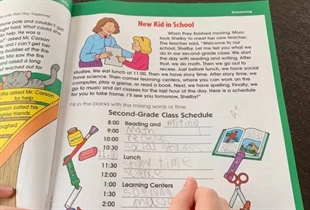A parent’s survival guide to self-isolating with your kids
Casey Wolfington
Tuesday, March 24, 2020

Forced closures and measures such as social distancing can be difficult and stressful. Eagle Valley Behavioral Health has identified some tips that may make things feel a bit more manageable.
Structure and schedules
Creating a schedule and structure can have substantial emotional benefits for both yourself and your children. During times of chaos, structure and routine assist in creating an internal sense of calm and predictability that can help everyone cope.
Many schools across the Eagle County school district have already created a plan for home and web-based learning. Use this as a backbone for your weekday schedule. Additionally, you may want to include activity blocks for things such as: spending time outside, reading, exercise, quiet time, art or creative time and free playtime.
Within your schedule, do not forget to include times for meals and snacks. Kids (and adults) tend to snack more often on more unhealthy options when food is constantly available. It may sound odd, but write your schedule down and post it for the family. Research suggests that schedules that are documented and visible have a greater likelihood of being followed.
Sleep and rest
When people spend the majority of the day within the home, they exercise less and burn fewer calories. This can also impact their sleep: some get more tired and others have the opposite problem.
Over the next three weeks, avoid having your child take naps if this is not already part of their daily routine. Avoid doing work or other activities in bed (even watching TV) and try to maintain your bed for sleep purposes only.
Try to encourage the family to maintain similar sleep routines as they would on a normal week. If you or your child is experiencing worry or anxiety while attempting to fall asleep, try a guided meditation. There are several excellent options available online: YouTube and mindfulness apps like Calm and Headspace are a great place to start.
Emotional expression and compassion
Forced closures are stressful and difficult. COVID-19 is scary. In resort communities, such as ours, many families are facing a multitude of stressors, impacting all parts of life. Give yourself and your children room for emotional expression.
If you or any family member needs a break, take it, and even better, encourage it. Model this important aspect of coping for our children. We are not robots, and this is an unprecedented event in our community. Emotions are real and they are not bad.
Create a time and space where your entire family can routinely discuss and express emotions. Also, if you need a break and it means that your kiddo is watching a movie or playing games on the iPad, it’s fine. Perhaps anticipate this need and download games that focus on educational skills or emotional awareness.
Above all … have compassion for yourself. It’s OK to be scared.
Dr. Casey Wolfington is a licensed clinical psychologist and the community behavioral health director for Eagle Valley Behavioral Health.